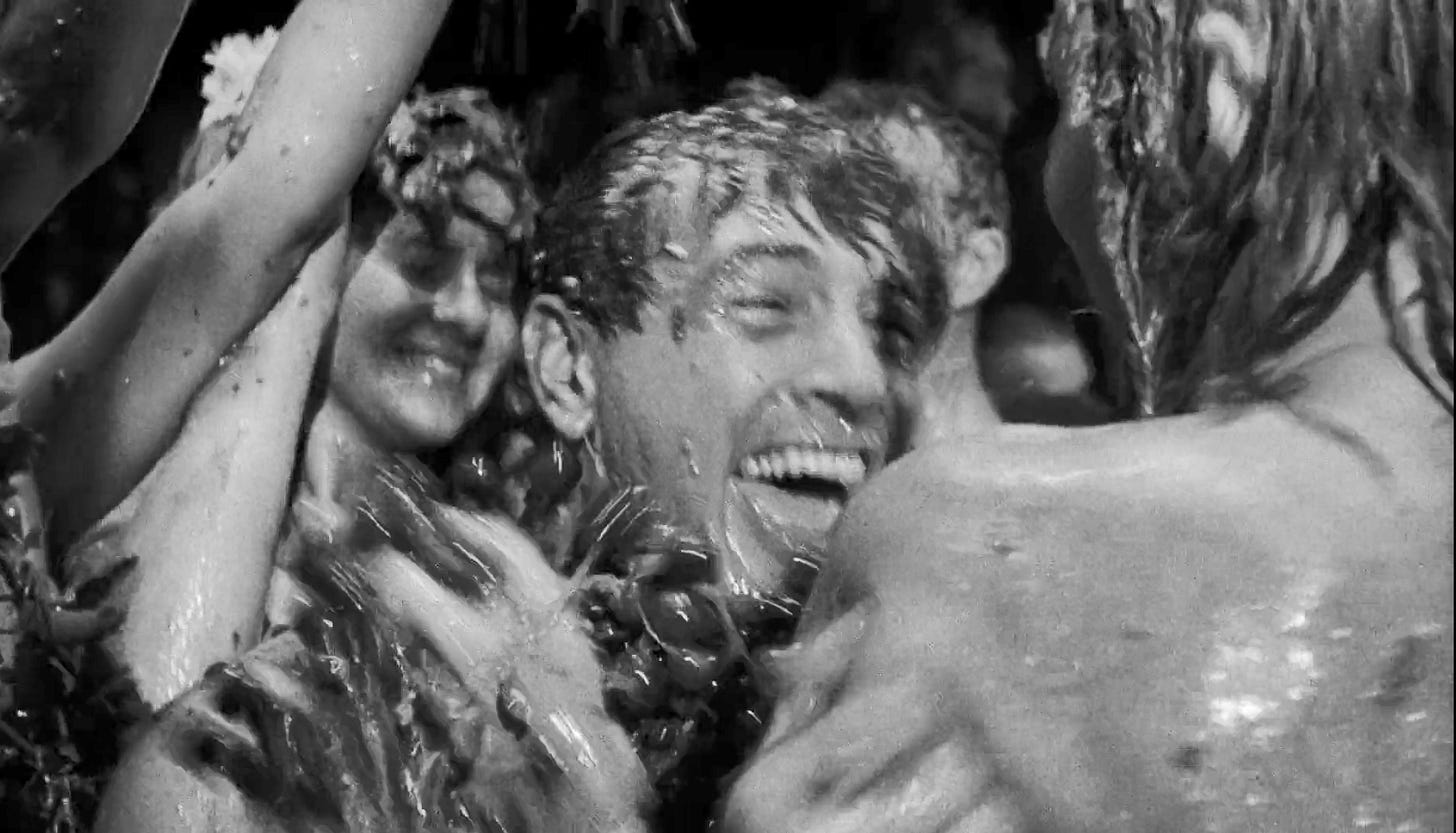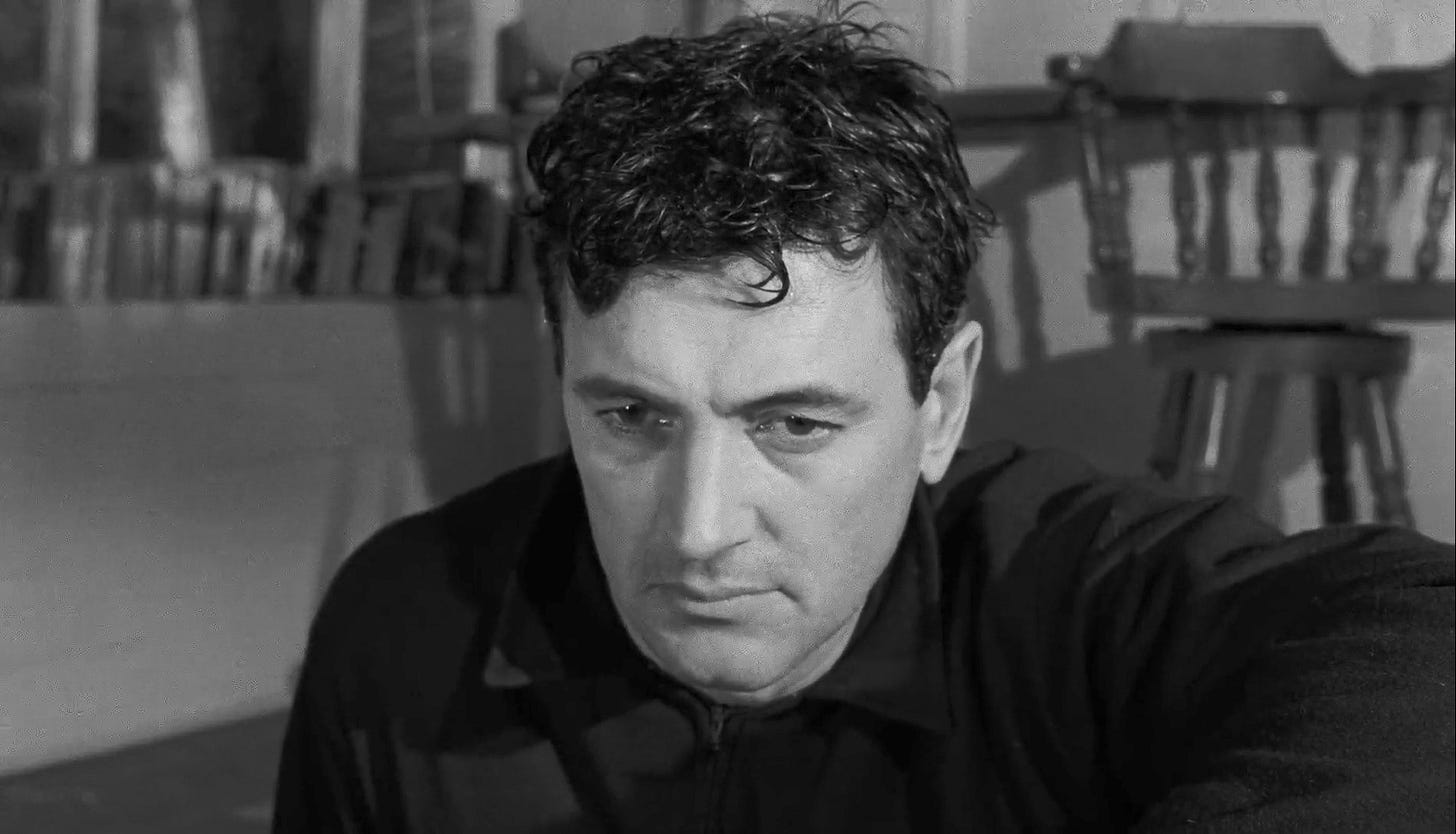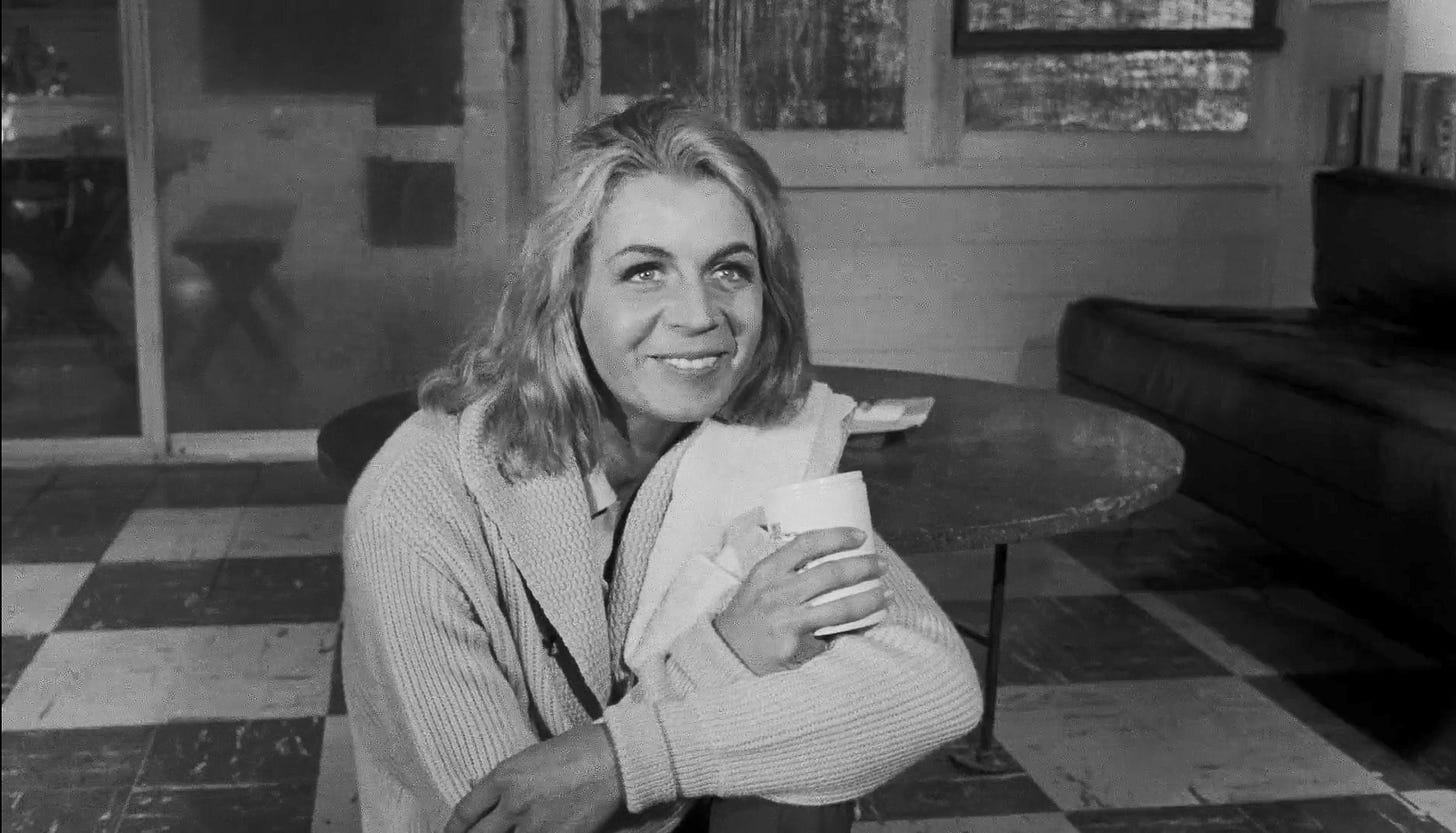Seconds, the Cis State, Endnotes, Bad Jokes
Tony wants a life free of control, but the joke’s on him; there is always someone out there telling you who you should be. Everyone else is in on it, so they know to act like they aren’t. Paradoxically, not knowing means not knowing how to act like you don’t… Even if they’re all as dissatisfied as he is, Tony’s ignorance threatens the protective shells his neighbors have built up. He leaves in the vain hope of remaining ignorant, refusing to laugh with the world.
You can read a new essay of mine, “‘I’m Dying, and That’s the World!’: Seconds and the Cis State on Film Cred. As a little bonus, enjoy an essay-length series of endnotes.
1. The obvious question one might have: “wait, so everyone has gender dysphoria?” Look, I’m not a psychologist, but it seems to me that as it stands “cisgender” is an only occasionally-useful heuristic. When you have terms like “cis enby” and “theyfab” thrown around, it’s clear that the use case isn’t for those who “aren’t trans” but for those aren’t “transsexual”—another heuristic, which relies on a tenuous notion of “biological sex.” How the state jams itself into the works of Seconds is that the only reasonable definition of sex is as an institutional output (as opposed to a definition of gender that tends to be rooted in personal feeling/expression).
Another common transphobic talking point that’s spewed without examination: it’s common for a reactionary feminist to say something like “I’m not cis! I’m a woman!” To some extent, this stems from the assumption that the prefix “cis” was invented by trans activists last Sunday. But it shouldn’t be discounted that, despite the fact that TERFs like to call themselves “gender critical,” their conception of “woman” is entirely gendered, and that cisness is incompatible with gender. Not to say we need more sympathy for the TERFs of the world; even if they’re de jure pro gender, it’s not on the basis of pushing against the state, but of naturalizing its demands. As Paisley Currah has pointed out, these demands are spread across institutions whose use for sex overlaps occasionally. The cis state’s appended definite article is just important a myth as cisness. The British human rights commission recently advocated for using “biological sex” as the sole metric for sex-based discrimination. The rhetoric is not explicitly anti-trans: in fact, one of the stated benefits is that trans men would be covered by EqA protections for pregnant women and mothers. The snag here is that any group getting more or less protection has no moral value. Instead, the methodology is of “bring[ing] greater legal clarity.” The most clarifying passage is on sports: “At present, to exclude trans women with a GRC from women’s sports, the organiser must show that it was necessary to do so in the interests of fairness or safety. A biological definition of sex would mean that organisers could exclude trans women from women’s sport without this additional burden.” It’s not that excluding trans women from sports is or needs be in favour of the Olympian spirit of fairness; it is nothing more than an attempted action by a private entity that the government’s heretofore recognition of trans people complicates.
But as another answer to the question: the idea that dysphoria is exclusive to those seeking medical transition is boring. That dysphoria is an indicator of transness is a bad, even dangerous idea. Transition is a genuinely redemptive experience: it doesn’t negate dysphoria, but is worthwhile act in and of itself. That medical interventions can be life-saving or gender-affirming is often true, but to treat them as ameliorations denies trans people political agency. None of what I’m saying here is particularly original, but it’s worth repeating.
2. “The Culture War” isn’t totally meaningless, but it generally applies to meaningless things, i.e. whether the Mario movie is woke or not. Where things get complicated, is when you have a ship of Theseus between outrage bait filler and actual government strategies. “Go woke go broke” snide over Netflix’s Q-Force; general fervour over drag queens; specific over drag queen storytime sessions; the general push from the American right to control the lives of children. The starting point is an extremity of the end, but it’s interchangeable with anything nominally woke and unsuccessful. Ian Danksin’s video on the subject from four years ago is great, and should be the only context anyone uses the paradox for. The question of whether the ship is the same as the start is a no-brainer: of course it’s the same; it’s still called the ship of Theseus. Likewise, you aren’t going to be furthering brilliant discussion by asking whether Bud Light, Joe Biden, and Black Lives Matter can all be woke at the same time. What matters is knowing that it’s part of a larger game of endlessly swapping out one term for the other, never maintaining a coherent position. I’ve heard a lot of people from the left argue that bigots are better at recruiting because they make more coherent and/or compelling points than we do. I don’t buy that, and I don’t even think they’re pretending to be coherent most of the time. They just happen to know that the ship of Theseus is the ship of Theseus, and thus keep sailing without worry.
3. Seconds’ sense of the kafkaesque should not go unmentioned. In the abstract: the surreality, the heaviness of it all; and then there’s how Arthur’s route to the Company’s offices, leading him through a garment factory and meat packing plant, mirrors The Trial’s law clerks who carry out their business in residential apartments and bank broom closets. The connections funnier when you realize that fellow closeted star Anthony Perkins stars as Joseph K. in Orson Welles’ adaptation of The Trial four years prior. His homosexuality was something Welles was well aware of and exploited, putting the closet on trial. Whether this was an addition to the text or not is up to you. To avoid distending my endnotes: the relationship between the individual and his government Kafka so frequently returned to is dysphoria at its finest. The Castle depicts an endless struggle on the part of K. to change his name an ambiguous initial to an officially recognized title. In Josephine the Singer, or the Mouse Folk, the titular singer puts herself at odds with the titular folk in her persistent attempts to be recognized as an artist, and thus be remembered amongst a people who constantly forget themselves. This is the last of kafka’s surviving stories, and perhaps the queerest of them all in how Josephine is presented by the narrator as an anomaly whose existence frustrates his ability to tell a coherent history of the folk. All this is obviously worth far more than a tangent.
4. My arrival to this take was spurred on by watching Seconds for the first time within the same month as Jane Schoenbrun’s We’re All Going to the World’s Fair, an incredible piece of trans cinema. Direct mention fell off mostly for space reasons, though the cis state angle was a clincher. Linking World’s Fair’s horror to politics feels a lot more tenuous, though the gist is still the same: that in living a public life, there will always be those who know you before you have the opportunity to know yourself. The climactic scene in which Casey realizes that the world’s fair challenge is a role-playing game—a joke that she refuses to be in on—parallels nicely with Seconds’ party scene. Youtube autoplay’s liminal milieu gestures towards an all-but-privatized way of being.
5. I was just scrubbing through the movie to get a good thumbnail and realized, does Salome Jens kinda look like tgirl Rock Hudson? This is partly fueled by seeing a post make the same point regarding Kate Winslet and Jim Carrey in Eternal Sunshine of the Spotless Mind. Is this just the brain worms talking? I’ll leave that to you.




